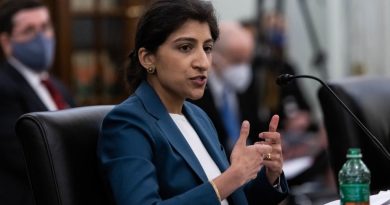Cops Are Using Facebook To Target Pipeline Protest Leaders

Protests against Enbridge’s Line 3 have been ramping up in Minnesota—and so has the response from authorities. A video went viral this week of a Department of Homeland Security helicopter sandblasting protesters following mass arrests. But some police tactics are far less visible while causing long-term hardship.
Advertisement
Much like the Dakota Access protests in 2016, social media has become central to getting the word out about the pipeline’s opposition, with leaders livestreaming or posting about their opposition. Police, however, have turned to social media to target activist leaders and, in some cases, charge them with crimes, according to public records obtained by Earther.
The records, which include thousands of emails and documents from Enbridge, local law enforcement, and state authorities spanning from 2019 to 2021, show that sheriff’s officers in one Minnesota county at the epicenter of the fight over the pipeline have used social media activity on at least one occasion to target key protesters weeks or months after protests take place with trumped up charges.
The Line 3 pipeline project, if completed, would carry 760,000 barrels of heavy crude from tar sands fields in Canada into the U.S. The current project is technically a replacement to an existing line originally built in the 1960s, and Minnesota is the last stretch of construction remaining on the replacement project. Controversially, the Line 3 replacement goes through new territory in Minnesota, including the Fond du Lac reservation and several treaty lands of Ojibwe bands. Indigenous groups have led the opposition while police have worked closely with—and, in some cases, been reimbursed by—Enbridge for the past few years to prepare for large-scale civil unrest during the pipeline’s construction.
On January 9, a few hundred people gathered at a Line 3 construction site in Aitkin County, one of the first places in Minnesota where construction started up on the pipeline in December. Local news reports show footage of a peaceful gathering of chanting and singing; eight people were arrested for trespassing, Minnesota Public Radio reported, after they did not disperse following police orders.
G/O Media may get a commission
But summonses Earther obtained from the Aitkin County Sheriff’s Office show that police used videos streamed and posted to Facebook to charge high-profile leaders in the Line 3 movement with several misdemeanor counts, including harassment, trespass, unlawful assembly, and public nuisance. These charges were filed January 27, two weeks after the actual protest occurred. (Charges against protesters arrested on the scene, separate summonses show, were filed two days later.)
Two charges for the January 9 protest that used livestreamed video as a basis were filed against some of the most visible Indigenous women leaders of the anti-Line 3 movement, including Winona LaDuke, arguably the most central figure in the opposition, and Tania Aubid, who went on a hunger strike in March to protest the pipeline. Another summons related to a charge of aiding and abetting trespassing was sent to organizer Shanai Matteson in late May, more than five months later, based on her Facebook activity and a livestreamed video also available on Facebook. Per Matteson’s summons, an officer watched a livestream recording of a separate January 9 event where Matteson encouraged protesters to be arrested “if that’s what it comes to today,” and offered resources for jail support. Matteson told Earther that she did not even attend the January 9 protest at the pipeline site.
Advertisement
“You think, ‘oh, I can just change my Facebook settings,’” said Marian Moore, another organizer who was at the January 9 protest. “But then I can’t reach people who aren’t my friends. It feels creepy, and weird.”
Advertisement
Some of the protesters charged were on the cops’ radar before the January 9 event even took place. In an email sent to a citizen discussing a separate incident on a Line 3 site in December, Aitkin County Sheriff Daniel Guida said that he’d asked a pipeline worker to stop harassing Aubid at a separate protest.
“I don’t appreciate her violent speech and blatant lies towards my office,” Guida wrote in the email. “Today she said I had white hatred groups on my payroll and was directing them to harass Indians. … If she only knew how hard I’ve fought to protect her rights.”
Advertisement
In an email, Guida told Earther that Aubid “has apologized to me for attacking me on camera. She has been very nice off camera. I appreciate her energy towards things she is passionate for and I am a friend of her family and hope to continue being one. One Anishinaabe core value is Gwekwaadiziwin (Honesty) and I hope our interactions can be based on truths.”
Aubid was later charged with gross misdemeanor harassment that police allege happened at the January 9 protest, which the summons says was caught on livestream. While her summons does not note the specifics for her harassment charge, the statement says that officers observed Aubid on the livestream telling construction workers “get nervous little boy. You don’t belong here.” LaDuke was also charged with harassment. Her summons states that she and Aubid were “disrupting the construction workers” at the site, with no specifics.
Advertisement
Guida said that “everyone has their own opinion what constitutes harassment (victim) and my office does investigations to those complaints” and that charging decisions are made by county attorneys.

Advertisement
In late January, just a few days before the charges for LaDuke and Aubid were filed, Guida was looped in by a city administrator on an email to Mattheson after she was denied a permit for an outdoor community gathering unrelated to Line 3. In response to her questions as to why she was denied an outdoor permit for a public education gathering that would follow covid-19 guidelines, Guida told her that she had been “directly involved with unlawful assemblies,” and that the city “has every right to use that against you, but they did not.”
“I’ve been part of rallies and marches, and other public advocacy against Line 3,” Matteson wrote back. “I’ve never been cited or prosecuted for unlawful assembly or any other illegal activities associated with it.”
Advertisement
In response, Guida told Matteson that her activity had been “documented, recorded, and very well might result in criminal charges. Because you didn’t get arrested or a citation does not mean the act is not illegal. And not being dealt with immediately does not mean it will not happen.” Guida told Earther that Matteson was already under investigation for the January 9 charges when he sent this email.
Matteson said that the conspiracy charges against her—which were filed right before large actions organized by Line 3 opposition for early this month, including one event where more than 200 people were arrested—mean she could face up to a year in jail and thousands of dollars in fines. “They’re trying to hold me responsible as an organizer,” she said of the January 9 events. “I’m not one of the movement leaders, but I do a lot of organizing and have lots of public opinions, and I live here and have lots of ties in the community. They want us discredited and criminalized in the community.”
Advertisement
At Matteson’s first appearance on Wednesday, a judge set a contested hearing date for October. Matteson was released on her own recognizance with the caveat that she not communicate with any Enbridge employee or be near any pipeline worksite, significantly hampering her opportunities for organizing in the summer.
Advertisement
Monitoring social media for Line 3 protesters appears to be part of a broader effort by Aitkin County officials. Other emails show that on January 13, a week after the Capitol Hill riots, Guida wrote a mass email to county staff about civil unrest and social media.
“We all have anxiety about demonstration groups coming to Aitkin County, as well as the rapidly changing events in the USA,” Guida wrote. “ … Over the last year, a large part of my time has been dedicated to predicting energy and planning on how to deescalate that energy to protect our community. A critical factor in that process is early intervention.”
Advertisement
Guida then laid out a table of more than two dozen events, most of them posted on Facebook and scheduled for January and February, with information on the locations, hosts, and estimated number of attendees. Among them were four Line 3 pipeline protests, including a “Salsa Tuesdays” event that told recipients to “come and stand and salsa for the rivers, our water.”
“I have added a list of the upcoming demonstrations so you can see this has turned into a normal thing for Law Enforcement across the state,” Guida added.
Advertisement
He told Earther that he “regularly update[s] my staff with upcoming events, so they can be prepared and ready to keep the peace.” He also added that most of the arrests in his county have been “very peaceful,” and that “another Anishinaabe core value Mnaadendimowin (Respect) has been very evident toward the people on both sides of this issue.” But as more attention is being paid to how cops are treating protesters on the ground this summer, it remains to be seen how they’ll keep up their attack online on organizers’ main line of communication.
“It’s quote-unquote understandable that [police] are following orders to remove people from Enbridge’s right-of-way,” said Moore. “It is a whole other kettle of fish for them to be proactively preventing organizing to inform people about the egregious actions that this corporation is taking.”
Advertisement
Correction 6/10/21 9:49 a.m.: This post has been updated to correct the spelling of Shanai Matteson’s last name.
READ MORE HERE



